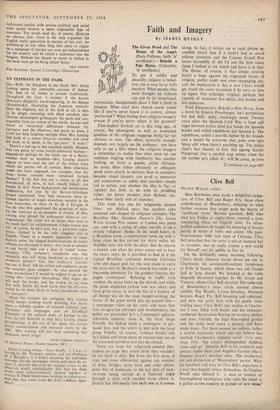AN ELEPHANT IN THE DARK
SIR,-With 'An Elepllant in the Dark' Mrs. Doris Lessing opens her admirable account of Sufism. This best of all fables is current traditionally throughout the East. I wonder if she knows Hokusai's delightful wood-engraving, in his Manga (sketchbooks), illustrating the Japanese version? Here the elephant, not in the dark at all, is seen to be simply swarming with blind acrobats who likewise misinterpret grotesquely the parts and con- sequently form no notion of the whole. As one well aware of occasional differences between the Spectator and the Observer, but party to none, I could not help laughing outright when Mrs. Lessing laid hold of a minor Observer member and cried out loud, so to speak, to the Spectator: 'A snake!'
There's a sad sag in this excellent middle. Blinded, may one guess, by some horrid emotional fantasy—
engendered perhaps by the ironic use of a Beach- comber term as headline—Mrs. Lessing doesn't appear to have read the rest of the review from which she quotes out of context. How otherwise could she have supposed, for example, that the three books covered were 'unrelated foreign Classics'? If the first was not a classic at all, but new-minted, all were, in fact, closely linked: not merely by their Asian backgrotind and simultaneous
Publication, but also by the Burton-Arbuthnot project mentioned. They had, moreover, been re- viewed together at length elsewhere, notably in the New Statesman, on June 19, by D. J. Enright. It was he who first questioned the propriety of treat- ing the Gulista,' as an example of erotica. If Mrs. Lessing also missed the subsequent Observer cor- respondence, she could not do better than turn to the book itself for enlightenment. Under review was
not, of course, Sa'adi's text, but a particular trans- lation, claimed to be the only complete one in
English.. There, in a massive apparatus of intro- ductory notes, the alleged bowdlcrisations of earlier editions are discussed in detail: they seem to amount to one brutal rape and a ,deal of 'coded' homo- sexuality. (The reviewer's complaint was that orientalia was still being marketed as erotica.) A children's primer? Yes, like Gulliver's Travels: but not so Swift. (Of the stilted and euphuistic prose the reviewer gave samples: he also praised the verse translations.) It would be tedious to go on re- futing Mrs. Lcssing's misreadings. One hopes she will read the books, and the review, to see how they tally. Surely she must know that the Observer Would be no More likely to boost xenophobia than the Spectator?
About the reviewer she castigates, Mrs. Lessing surely knows nothing worth knowing. For thirty Years a htfmble student of oriental cultures, arts, literatures and languages, and an Unofficial Reminder of the cultural debts of Europe to the East, he felt flattered to find Mrs. Lessing almost Paraphrasing, in the rest of her space, his various Pieces commissioned and executed lately by the BBC, Mrs. Lessing will not need reminding that elephants never forget.
HUGH GORDON POItTEUS HUGH GORDON POItTEUS
96 Holbein House, Sloane Square, SW!
[Doris Lessing writes.—'Very briefly: 1. I was re- ferring to Mr. Porteus's reviews and not Professor D.1. Enright's; 2, I wasn't attacking the individual reviewer, but the newspaper which published the re- view; 3, Anyone who read the original review in the Observer would unmistakably find that the three books were indiscriminately lumped together as erotica; 4. These books have nothing in common ex- cept that they come from the East:—Editor, Spec- tator].




























 Previous page
Previous page